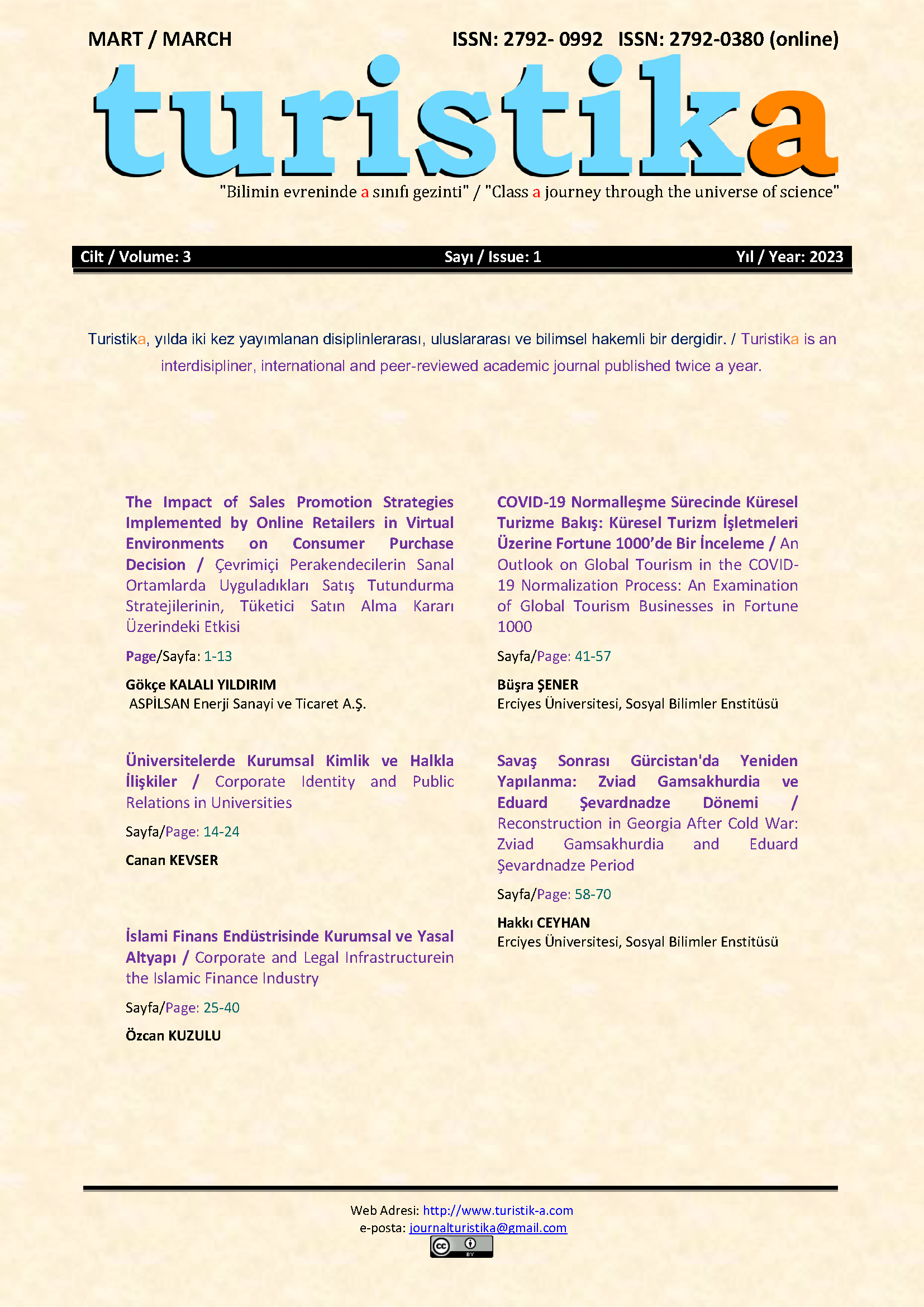An Outlook on Global Tourism in the COVID- 19 Normalization Process: An Examination of Global Tourism Businesses in Fortune 1000

Published 31.03.2023
Keywords
- Covid-19,
- Fortune,
- Global Businesses,
- Tourism Sector
- Covid-19,
- Fortune,
- Küresel İşletmeler,
- Turizm Sektörü
How to Cite
Copyright (c) 2025 Büşra Şener (Yazar)

This work is licensed under a Creative Commons Attribution-NonCommercial-NoDerivatives 4.0 International License.
How to Cite
Abstract
It has been observed that the effects of the Covid-19 process are reflected on all kinds of businesses on a global scale. Studies in the literature have sufficiently revealed the negative effects of the process on businesses. This study was carried out to determine how the mentioned effects changed in the tourism sector on a global basis during the Covid- 19 normalization process and their effects on businesses. For this purpose, global tourism businesses in the Fortune 1000 were examined by secondary data scanning by comparing the data of 2021 based on 2022 in terms of the determined sectors (food and beverage, accommodation, entertainment and transportation). In this context, 12 food and beverage, 8 accommodation, 5 entertainment and 8 transportation businesses were examined. Findings for the data show that food and beverage, accommodation, entertainment and transportation businesses have been positively affected during the Covid-19 normalization process.
References
- Akduru, H. E. (2020). Covid-19 pandemisinin konaklama sektörü üzerine etkisi: Bodrum/Türkiye’den bir araştırma. Electronic Turkish Studies, 15(8), 3359-3371.
- https://dx.doi.org/10.7827/TurkishStudies.45 334
- Aşar, D. (2021). Turizmde kriz yönetimi, destinasyon imajı ve Covid-19 örneği üzerine bir değerlendirme. Turistika, Aralık, 1(1), 1-14.
- Beyazgül, M., Öcek, C., & Karadeniz, E. (2022). Covid-19 salgınının kara, deniz ve havayolu yolcu taşımacılığı sektörlerinin likidite ve finansal başarısızlık risklerine etkisinin analizi. Güncel Turizm Araştırmaları Dergisi, 6(1),
- 282-300.
- https://doi.org/10.32572/guntad.1058622
- Chowdhury, M., Sarkar, A., Paul, S. K., & Moktadir, M. (2020). A case study on strategies to deal with the impacts of COVID-19 pandemic in the food and beverage industry. Operations Management Research, (15), 166-178.
- https://doi.org/10.1007/s12063-020-00166-9
- Cömert, M., & Kanoğlu, E. (2022). Covid-19 dönemi zincir yiyecek içecek işletmelerinde tedarik sıkıntıları ve çözüm. Journal of Tourism and Gastronomy Studies, 10(3), 2069-2088.
- https://doi.org/10.21325/jotags.2022.1082
- Demirdelen Alrawadieh, D., & Çifçi, I. (2021). Covid- 19 salgını sonrası yiyecek ve içecek sektörü: mutfak şeflerinin perspektiflerine yönelik bir araştırma. Güncel Turizm Araştırmaları Dergisi, 5(2), 439-454.
- https://doi.org/10.32572/guntad.944613
- Doğru, E., & Koçak, E. (2021). Covid-19 salgınının turistik hizmet sağlayan konaklama işletmelerine etkisi (Fethiye örneği). Doğu Coğrafya Dergisi, 26(45), 106-124.
- https://doi.org/10.17295/ataunidcd.848544
- Dombey, O. (2004). The effects of SARS on the Chinese tourism industry. Journal of Vacation Marketing, 10(1), 4-10.
- DSÖ (2023). Dünya Sağlık Örgütü,
- https://covid19.who.int/
- Eren, E. (2002). Stratejik yönetim ve işletme politikası. İstanbul: Beta Yayınları.
- Fortune (2022).
- https://fortune.com/ranking/fortune500/
- Geranaz, H., & Yılmaz, H. (2022). Covid-19
- pandemisinin Türkiye’de farklı turizm çeşitleri üzerindeki etkisinin Google-Trends verileri aracılığıyla incelenmesi, Journal Of Gastronomy, Hospitality and Travel, 5(2) 880-898.
- https://doi.org/10.33083/joghat.2022.174
- Glaesser, D. (2004). Crisis management in the tourism industry. Routledge.
- Gursoy, D., Chi, C. G., & Chi, O. H. (2020). Covid-19 study 2 report: restaurant and hotel industry. In would they come back? If they would, when?. Carson College of Business,
- Washington State University.
- Güllü, K. (2008). Uluslararasılaşmanın dinamikleri uluslararası pazarlar ve perakendeci işletmelerin uluslararası pazarlama
- etkinlikleri, Erciyes Üniversitesi Sosyal Bilimler Enstitüsü Dergisi, 25(2), 119-140.
- Harris, R. G. (1993). Globalization, trade, and income. The Canadian Journal of Economics/Revue canadienne d'Economique, 26(4), 755-776.
- Henderson, J. (2007). International tourism and infectious disease: managing the SARS crisis in Singapore. İçinde E. Laws. B. Prideaux ve K. S. Chon (Eds.), Crisis management in tourism (ss. 186-199). Wallingford UK: CABI.
- ILO (2020). International Labour Organization, https://www.ilo.org/global/about-the- ilo/WCMS_738753/lang--en/index.htm
- İflazoğlu, N., & Aksoy, M. (2020). Tüketicilerin Covid-19 salgını sürecinde yiyecek-içecek
- işletmelerinden bekledikleri hizmetin
- niteliğine ilişkin bir araştırma. Journal of Tourism and Gastronomy Studies, 8(4), 3362-3377.
- https://doi.org/10.21325/jotags.2020.766
- İlter, Ü.E. & Bulut, Y. (2021). Covid-19 sürecinde küresel turizme bir bakış: Fortune 1000’de yer alan küresel turizm işletmelerine yönelik
- sektörel bir değerlendirme. Turistika, Aralık, 1(1), 81-93.
- Kılıç Karamahmutoğlu, M. (2022). Covid-19’un sektörlerin finansal performansına etkisinin oran analizi yöntemi ile incelenmesi. Muhasebe ve Finansman Dergisi, (95), 35-56. https://doi.org/10.25095/mufad.1086620
- Kılıç, B., Aslan, H., & Gövce, M. (2020). Covid-19 sonrası turistik tüketim tutumu. Gaziantep University Journal of Social Sciences, 19(COVID-19 Special Issue), 554-570. https://doi.org/10.21547/jss.787982
- Koçak Bilgin, Y., & Tekeli, H. N. (2022). Covid-19'un yiyecek içecek işletmelerine olan etkisi. Dogus University Journal, 23(Covıd-19 Özel Sayısı), 281-301.
- https://doi.org/10.31671/doujournal.104165 5
- Mat Som, A. P., Ooi, C. A., & Hooy, C. W. (2014). Crisis typologies and tourism demand.
- Anatolia, 25(2), 302-304.
- https://doi.org/10.1080/13032917.2013.876 549
- Nhamo, G., Dube, K., & Chikodzi, D. (2020). Covid- 19 and implications for the aviation sector: A global perspective. İçinde Counting the Cost of COVID-19 on the Global Tourism Industry (s. 89-107). Springer, Cham.
- Otsubo, S. (1996). Globalization: a new role for developing countries in an integrating world.” World Bank Policy Research Working Paper No.1628.
- Robertson, R., & White, K. E. (2007). What is globalization. İçinde G. Ritzer (Ed.) The Blackwell companion to globalization, (s. 54-66). John Wiley & Sons.
- TCMB (2020). Türkiye Cumhuriyet Merkez Bankası, https://www.tcmb.gov.tr/wps/wcm/connect/ 52c62ec4-2024-4337-8c53- 633890ad02d2/Kutu 6_1_2020-
- 2.pdf?MOD=AJPERES&CACHEID=ROOTWORK SPACE-52c62ec4-2024-4337-8c53- 633890ad02d2-n7aayCC (Son Erişim Tarihi: 10.02.2023)
- TÜRSAB (2020). Türkiye Seyahat Acentaları Birliği, https://www.tursab.org.tr/apps//Files/Conte nt/6ad52b35-1dd2-41c2-9f1c- c24cc19e7a63.pdf (Son Erişim Tarihi: 27.03.2023)
- UNWTO (2020). Birleşmiş Milletler Dünya Turizm
- Örgütü, https://webunwto.s3-eu-west-
- 1.amazonaws.com/s3fs-public/2020- 06/americas.pdf (Son Erişim Tarihi:
- 27.03.2023).
- Yenişehirlioğlu, E., & Salha, H. (2020). Covid 19 pandemisinin Türkiye iç turizmine yansımaları: değişen talep üzerine bir araştırma. İstanbul Ticaret Üniversitesi Sosyal Bilimler Dergisi, 19(37), 355-368.

